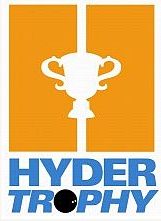Hyder Final: El Hindi Rallies Past Razik In Thrilling Final, Grainger Takes Women’s Title
by Rob Dinerman, for DailySquashReport.com

Dateline May 20th, 2012 --- Down triple-match-ball in the fourth game of a match he had completely dominated early on but that appeared to have slipped irretrievably away from him, second seed Wael El Hindi courageously forced a tiebreaker, saved yet another match-ball against him under the most capricious of circumstances and persevered to a 11-3 7-11 6-11 13-11 11-7 victory over No. 1 seed Shahier Razik this afternoon at the Sports Club/LA in the final round of the $10,000 Quentin Hyder Invitational. In so doing, El Hindi duplicated his (also airtight, as witness the 11-9 fifth-game score) Hyder final-round win over the three-time Hyder champion Razik in 2007 and demonstrated not only the prepossessing physical and racquet talents that had brought him as high as No. 8 in the PSA world pro rankings but also the resolve to wrest this match from Razik’s grasp at the last possible moment. It was also the second straight Hyder for Razik, who won this event in 2003, 2006 and 2010, in which he stood at championship-point but was unable to take the final step; last year, he led Alister Walker, 14-13 in the fifth game before Walker (who had entered this 2012 event but had to withdraw after hurting his foot earlier in the week at the British Open) won the final three points.
In truth, and in light of the way the match began, it was a wonder that Razik even was able to get to match-ball; El Hindi galloped from the gate, jumping on every ball, nailing overheads into the nick, displaying the full measure of his amazing athleticism, and ambushing Razik with such thoroughness that when El Hindi finally tinned a backhand cross-drop volley at 10-love, the slender Canadian threw his fist in the air in mock celebration at having avoided a shut-out. The second game also began well for El Hindi, but by this time, Razik had gotten his teeth into the match, contesting the points, making El Hindi work harder than before and frustrating him by flowing gracefully to seeming winners and returning them, usually with depth and purpose. Razik at his best can gradually but inexorably suck the energy out of an opponent’s arsenal, resulting in mid- and late-game tinning patches and disheartening strings of points. He had done that to Bradley Ball in the quarterfinals, as well as to Zac Alexander in the semifinals during the past few days, and he would do that as well in both the second game (with a six-point closing run from 5-7 to 11-7) and the third (from 5-all to 11-6) against El Hindi, who dispiritedly hit a forehand overhead into the bottom of the tin to end the third game, whereupon he exited the court with a downcast expression on his face.
It was actually a sizable and vocal cheering section (presumably composed largely of clients and fans from Cityview, where El Hindi, who relocated to New York a little over a year ago, does his coaching) located behind the right side of the glass-back-wall that bucked him up as he re-entered the court for the fourth game. Much of the sharpness and aggressiveness that had slowly evaporated since the first game seemed restored as he battled Razik to a standstill (one filled with lengthy exchanges in which the ball clung TIGHT to the left wall) to 7-all, but when Razik first steered a delicate backhand drop shot winner, then hit a forehand too close to the front wall to be returned, preceding an El Hindi tinned overhead, the score had become 10-7 and Razik appeared to be home free. But El Hindi strung together three straight points of his own – a stroke call against Razik, followed by an El Hindi overhead into the front-right nick and a backhand that he lashed past Razik --- to force a tiebreaker, on the first point of which, cruelly, his racquet string broke, resulting in a tin that gave Razik a fourth match ball. In the end-stages of the second and third games, El Hindi had become disillusioned when referees’ decisions or unexpected circumstances had gone against him, but this time he remained resolute and (five lets later) rifled a forehand drive for 11-all, then collected a stroke call in his favor and buried a perfect drop shot to rescue that game from seeming oblivion.
Three uncharacteristically consecutive tins from Razik gave El Hindi a 4-1 lead in the fifth game that he would never fully relinquish, though Razik would draw to within a single point twice (at 3-4 and later at 6-7) before bowing to a determined close-out El Hindi sprint to the tape. There were plenty of “traffic” problems along the left wall, where both players seemed to have decided the match would be decided, and a number of appeals of airtight referees’ decisions as well. But --- and this was a big difference from their unappetizing dispute-filled match five years earlier --- even under the duress of a hard-fought fifth game and with both players battling fatigue as well as each other, it must be noted that both players showed great respect for each other and for the game, examples being the way they clapped their hands against their racquets in appreciation of their opponent’s winners, or, most notably, when on a controversial let call on which Razik unsuccessfully appealed to the refs that El Hindi’s ball had caught the tin, the latter (ahead 5-3 at the time, the outcome still fully in doubt) scanned the gallery for one of his respected pro colleagues, who hand-signaled him that the ball had indeed been “down,” whereupon El Hindi then deliberately hit his subsequent serve out of court to make sure that Razik got that point, a sportsmanlike gesture that deservedly earned him a ringing round of applause.
El Hindi then hit an overhead winner for 6-4, nailed a shallow backhand winner to restore his three-point cushion, and at 9-7 muscled a forehand drive to perfect length that died at the back right corner to get to the same 10-7 advantage that Razik had held but failed to convert one game earlier. Razik then hit a nice backhand cross-drop from deep in the court which, however, he didn’t come in behind (possibly acknowledging that his cause was lost, though it was a jarring contrast from his match-long presentation), and when El Hindi pounced upon the ball and responded with a sweet re-drop, it was a winner by 20 feet and a fitting capstone to the glorious comeback he had achieved.
There was also a $2,000 four-player women’s pro event that devolved into a similar five-years-later rematch (this time of the 2007 U. S. Nationals final) between Natalie Grainger and Latasha Khan. Grainger is a former British Open and World Open finalist, but she retired a few years ago from the WISPA circuit, while Khan, a six-time U. S. National champion who held that title throughout the early-2000’s before Grainger displaced her and began a five-year skein of her own, is still, remarkably at age 39, competing and getting good results on the pro tour. Grainger’s superior skill level and wonderful front-court touch enabled her to capture the first game and, with greater difficulty, the second. But by then she was starting to tire and she fell behind 6-0 in the third game and had to cede the remainder of the game and conserve her strength for the fourth.
She appeared ready to capsize again when a trio of tins put her behind 5-4, but she was able to score on a forehand straight drop (a ball she ALWAYS seems to guide accurately into the nick), then on a perfect-width forehand that cleanly passed Khan, who surrendered the next two points as well (8-5 from 4-5). A long point at 9-6 ended up with a winded Grainger stuck at the back wall, unable to pursue Khan’s drop-shot winner (7-9), leading up to the match’s defining moment, with Khan having an open ball on her forehand, which however she nailed into the tin (10-7 instead of 8-9, an enormous swing), after which Grainger salted away yet another forehand straight-drop winner and breathed a sigh of both exhaustion and relief.
The top men’s Open draw, the 6.0, was won for the second straight year by Columbia coach and ISDA doubles performer Jacques Swanepoel, who subdued high-school senior Faraz Khan in a straight-set final, possibly one too many match for Khan, who had qualified into the pro main draw Tuesday night and pulled off a praiseworthy upset win over S. L. Green quarterfinalist Graham Bassett in the first round. Kelsey Engman won the top women’s amateur flight, the 5.5, defeating Harvard freshman Julianne Chiu in the final. Altogether, more than 200 amateur contestants, in many cases coming from all parts of the country, and even some foreign countries, entered one of another of the many competitive flights, another affirmation of the Hyder’s status as the most popular and well-subscribed tournament of its kind in North America, and a tribute as well to Kenny Scher, the longtime Executive Director of New York Squash (former known as the Metropolitan Squash Racquets Association), the tireless and unflagging efforts of Corey Modeste, the tournament chair of this event throughout the past several years, and the wisdom and vision of Dr. Hyder himself, still going strong (and in attendance at the final) at age 82, in founding this tourney in 1969 and in playing such a role in its growth and current exalted standing.
DRAW
Back To Main


